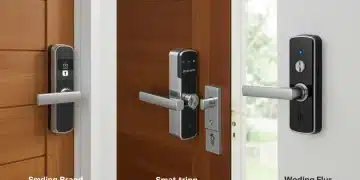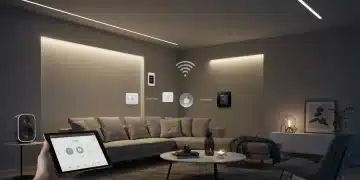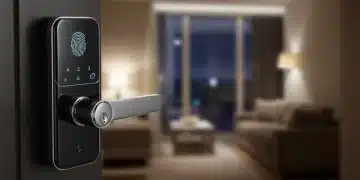Smart Locks Tested: Security, Convenience, & Smart Home Integration
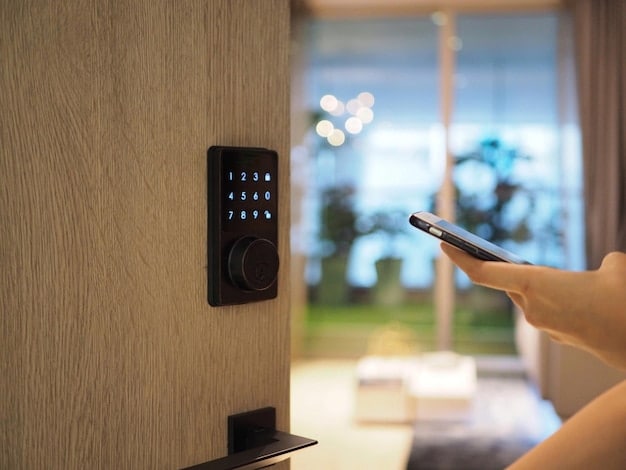
Smart locks enhance home security and convenience by integrating with smart home systems, offering keyless entry, remote control, and enhanced monitoring capabilities.
Are you considering upgrading your home security with a smart lock? Smart locks tested: security, convenience, and integration with smart home systems are at the forefront of modern home automation, providing keyless entry and enhanced control. This article delves into the benefits, security considerations, and integration aspects of smart locks, helping you make an informed decision.
Understanding Smart Locks: An Overview
Smart locks represent a significant advancement in home security, offering features that traditional locks simply can’t match. They provide a blend of convenience and control, allowing homeowners to manage access to their homes remotely.
These devices replace or augment traditional deadbolt locks, incorporating electronic components and wireless connectivity to enable keyless entry and integration with other smart home devices.
Key Features of Smart Locks
Smart locks come equipped with various features designed to enhance security and convenience. Understanding these features is crucial for selecting the right lock for your needs.
- Keyless Entry: Allows access via smartphone, keypad, or biometric authentication, eliminating the need for physical keys.
- Remote Control: Enables locking and unlocking doors from anywhere using a smartphone app.
- Activity Monitoring: Provides a log of who enters and exits the home, enhancing security awareness.
Additionally, many smart locks offer temporary access codes for guests or service providers, granting controlled access without distributing permanent keys. This feature is particularly useful for vacation rentals or short-term visitors.
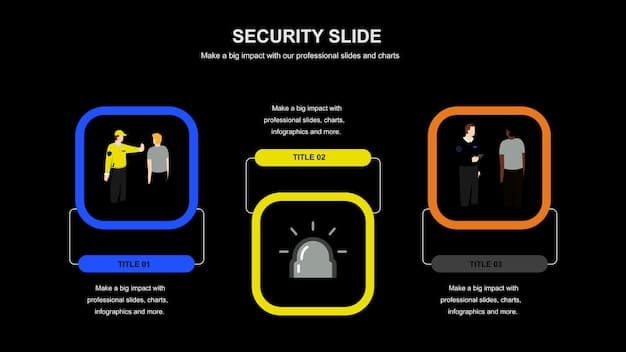
Beyond basic functionality, some smart locks offer advanced features like voice control integration with Amazon Alexa or Google Assistant, adding another layer of convenience. The ability to integrate with smart home ecosystems further enhances the overall user experience.
In conclusion, smart locks offer a range of features that improve security and convenience. By understanding these features, homeowners can confidently choose a smart lock that meets their specific requirements.
Assessing the Security of Smart Locks
While convenience is a major draw, the security of smart locks is paramount. Understanding the potential vulnerabilities and security measures is crucial for protecting your home.
Smart locks rely on wireless communication, which can be susceptible to hacking and unauthorized access. However, manufacturers implement various security protocols to mitigate these risks.
Common Security Concerns
Several potential security flaws can affect smart locks. Being aware of these concerns helps in making informed decisions and taking necessary precautions.
- Hacking Vulnerabilities: Smart locks can be targeted by hackers attempting to gain unauthorized access.
- Wireless Interference: Signal jamming can disrupt communication between the lock and the user’s device.
- Physical Tampering: The lock mechanism itself can be vulnerable to physical attacks.
To address these concerns, smart lock manufacturers employ encryption, two-factor authentication, and tamper alerts. These measures help protect against various types of attacks.
Encryption scrambles the data transmitted between the lock and the user’s device, making it difficult for hackers to intercept and understand the information. Two-factor authentication adds an extra layer of security by requiring a second form of verification, such as a code sent to the user’s phone.
Tamper alerts notify the user if someone attempts to physically manipulate the lock, providing an early warning of potential intrusion. Regular software updates are also crucial for patching security vulnerabilities and keeping the lock secure.
In conclusion, while smart locks are not entirely immune to security risks, the security measures implemented by manufacturers significantly reduce the likelihood of unauthorized access. By understanding these measures and taking appropriate precautions, homeowners can confidently use smart locks to enhance their home security.
The Convenience Factor: How Smart Locks Simplify Your Life
Beyond security, smart locks offer a level of convenience that traditional locks simply can’t match. They can streamline your daily routines and provide peace of mind.
The ability to unlock your door remotely, grant temporary access to guests, and monitor entry and exit activity can transform your experience as a homeowner or renter.
Benefits of Keyless Entry
Keyless entry is one of the most significant conveniences offered by smart locks. It eliminates the need to carry physical keys, reducing the risk of lockouts.
With keyless entry, you can unlock your door using a smartphone app, a keypad, or even your fingerprint. This is particularly useful when your hands are full or when you need to grant access to someone remotely.
Remote access is especially beneficial for Airbnb hosts or homeowners who frequently have guests. You can create unique access codes for each guest, granting them temporary access without sharing permanent keys.
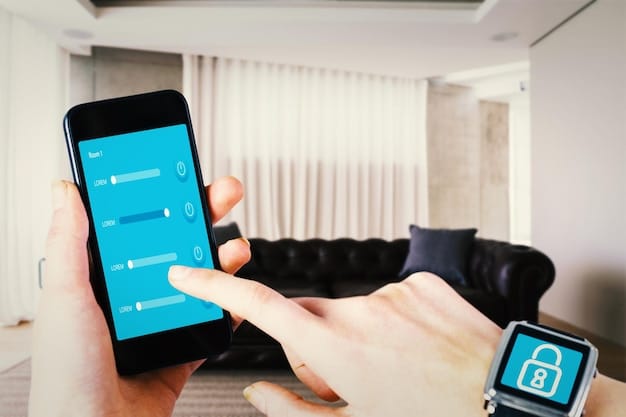
Furthermore, smart locks can integrate with other smart home devices, such as security cameras and alarm systems. This integration allows you to create automated routines, such as automatically locking the door when you arm the alarm system.
- Seamless Integration: Connects with other smart home devices for enhanced automation.
- Temporary Access: Easily grant access to guests or service providers.
- Remote Monitoring: Track entry and exit activity from anywhere.
The convenience of smart locks extends beyond keyless entry and remote access. They provide a level of control and monitoring that traditional locks simply can’t match, making your life easier and more secure.
In summary, the convenience factor is a significant advantage of smart locks. They simplify your life by providing keyless entry, remote access, and integration with other smart home devices. These features enhance security and provide peace of mind.
Integrating Smart Locks with Your Smart Home Ecosystem
One of the most compelling aspects of smart locks is their ability to integrate seamlessly with other smart home devices. This integration creates a more cohesive and automated home environment.
By connecting your smart lock to other smart home devices, you can create custom routines that enhance security and convenience. This level of integration allows for a truly personalized smart home experience.
Popular smart home platforms like Amazon Alexa, Google Assistant, and Apple HomeKit offer seamless integration with a wide range of smart locks. This allows you to control your lock using voice commands or through a centralized smart home app.
Benefits of Smart Home Integration
Integrating smart locks with your smart home ecosystem offers several benefits, including enhanced security, convenience, and automation.
- Enhanced Security: Integrate with security cameras and alarm systems for comprehensive protection.
- Convenient Control: Manage your lock using voice commands or a centralized smart home app.
- Automated Routines: Create custom routines that automate various tasks, such as locking the door when you leave.
For example, you could create a routine that automatically locks the door, arms the alarm system, and turns off the lights when you say, “Alexa, goodnight.” This level of automation simplifies your daily routines and provides peace of mind.
Furthermore, smart home integration allows you to monitor your lock remotely. You can receive notifications when someone enters or exits your home, providing you with real-time security awareness. You can also use your smart home app to lock or unlock the door from anywhere in the world.
In conclusion, integrating smart locks with your smart home ecosystem offers significant benefits, including enhanced security, convenience, and automation. This level of integration allows you to create a more cohesive and personalized smart home experience.
Choosing the Right Smart Lock for Your Needs
Selecting the perfect smart lock requires careful consideration of various factors, including your budget, security needs, and compatibility with your existing smart home ecosystem.
With a wide range of smart locks available on the market, it’s essential to research and compare different models to find the one that best suits your specific needs.
Before making a purchase, consider the type of door you have, the level of security you require, and the features that are most important to you. Also, ensure that the smart lock is compatible with your existing smart home devices.
Factors to Consider When Choosing a Smart Lock
Several factors should be taken into account when choosing a smart lock. These factors include security features, compatibility, ease of installation, and battery life.
- Security Features: Look for locks with encryption, two-factor authentication, and tamper alerts.
- Compatibility: Ensure the lock is compatible with your smart home ecosystem and other smart devices.
- Ease of Installation: Choose a lock that is easy to install or consider professional installation.
Additionally, consider the battery life of the smart lock. Some models use replaceable batteries, while others use rechargeable batteries. Choose a model that offers long battery life and easy battery replacement or recharging.
Another important factor to consider is the design of the smart lock. Choose a model that complements the style of your home and fits your aesthetic preferences. Also, consider the size and shape of the lock to ensure it fits properly on your door.
In summary, choosing the right smart lock requires careful consideration of various factors. By researching and comparing different models, you can find the one that best suits your specific needs and enhances the security and convenience of your home.
Maintenance and Troubleshooting of Smart Locks
Like any electronic device, smart locks require regular maintenance and occasional troubleshooting to ensure optimal performance. Proper maintenance can extend the life of your smart lock and prevent potential issues.
Regularly check the battery life, clean the lock mechanism, and update the software to keep your smart lock running smoothly. Also, be prepared to troubleshoot common issues, such as connectivity problems and lock malfunctions.
One of the most common maintenance tasks is replacing or recharging the batteries. Low batteries can cause the lock to malfunction or stop working altogether. Be sure to replace or recharge the batteries as needed.
Common Issues and Solutions
Several common issues can affect smart locks. Understanding these issues and their solutions can help you keep your smart lock running smoothly.
- Connectivity Problems: Ensure your Wi-Fi network is stable and the lock is within range.
- Lock Malfunctions: Check the battery life and clean the lock mechanism.
- Software Issues: Update the lock’s software to the latest version.
If you experience connectivity problems, try restarting your router or moving the lock closer to the router. Also, check the lock’s documentation for troubleshooting tips.
If the lock malfunctions, try cleaning the lock mechanism with a soft cloth. Also, check the battery life and replace or recharge the batteries as needed. If the problem persists, contact the manufacturer for assistance.
In conclusion, smart locks require regular maintenance and occasional troubleshooting to ensure optimal performance. By following these tips, you can keep your smart lock running smoothly and prevent potential issues.
| Key Point | Brief Description |
|---|---|
| 🔑 Keyless Entry | Unlock via smartphone, keypad, or biometric authentication, eliminating keys. |
| 📱 Remote Control | Lock and unlock doors from anywhere using a smartphone app. |
| 🛡️ Security | Features like encryption, two-factor authentication, and tamper alerts. |
| 🏠 Integration | Seamlessly connects with other smart home devices for enhanced automation. |
FAQ
▼
Smart locks offer enhanced security features like encryption and remote monitoring, which traditional locks lack. However, their security depends on proper configuration and regular updates. They are generally more secure when correctly implemented.
▼
Like any electronic device, smart locks can be vulnerable to hacking. However, manufacturers implement security measures like encryption and two-factor authentication to mitigate these risks. Regular software updates are crucial to patch vulnerabilities.
▼
Most smart locks have battery backups to ensure they continue to function during power outages. Some models also offer a physical key override for emergency access. It is essential to check the battery levels regularly.
▼
Many smart locks are designed for easy DIY installation and can replace existing deadbolts. However, some models may require professional installation, especially if they involve wiring or integration with existing security systems.
▼
Smart locks allow you to generate unique access codes for guests or service providers. These codes can be set to expire after a specific period, providing secure and controlled access without sharing permanent keys.
Conclusion
In conclusion, smart locks tested: security, convenience, and integration with smart home systems offer a compelling upgrade to traditional locks, enhancing both security and convenience. While potential vulnerabilities exist, the benefits of keyless entry, remote control, and integration with smart home ecosystems make them a worthwhile investment for modern homeowners seeking to simplify their lives and enhance their home security.
